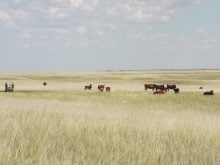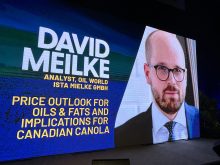Nutritionist sets out to debunk the argument that vegetarianism and veganism are the only healthy choices for the future
Author and nutritionist Diana Rodgers has taken on many modern myths surrounding red meat and cattle production.
A partial list includes:
- Beef causes cancer and/or heart disease.
- Beef is unnecessary in modern diets.
- Cattle production is bad for the environment.
- Raising cattle for beef is unethical.
- Plant-based protein is cleaner.
Rodgers approaches these concepts and others in her book and documentary, both entitled Sacred Cow. She discussed her approach Nov. 5 in a web presentation organized by the Manitoba Forage and Grasslands Association and discounted each of the above points.
Read Also

Beef check-off collection system aligns across the country
A single and aligned check-off collection system based on where producers live makes the system equal said Chad Ross, Saskatchewan Cattle Association chair.
Rodgers said arguments against meat fail to look at the whole picture and the intersection between optimal human health and regenerative agriculture.
“What I’ve noticed is that most people who are looking at what the most sustainable diet is, what the healthiest diet is, are really looking at our broken current industrial food system and trying to figure out how are we going to feed people, the best option out of that,” she said.
“Cattle and beef are misunderstood. It is the wrong target.”
Rodgers said she became interested in food production while working on farms during her college years in the United States and has lived on a farm for the past 18 years. In that time, she said she has seen the benefits of including animals in the nutrient cycle of food production.
“I started noticing that everyone who was talking about sustainability and long-term nutrition were saying that it must be a vegetarian or vegan diet for the future and nobody was pushing back against that. All the dietitians were signing on. All the environmentalists were signing on… I just couldn’t believe nobody was questioning this. To me it makes no sense at all.”
She described her explanations about the benefits of ruminants in food production and sustainability as “like a game of Whack-a-Mole” as different anti-meat claims arise. They run the gamut from ethics to greenhouse gas emissions, heart health to land use.
Those who oppose cattle and beef production view their stance as a sacred cow, which she defined as “an idea, custom or institution held, especially unreasonably, to be above criticism.”
Rodgers provided data on the nutrition contained in beef, questioned claims of any link with cancer and heart disease and discussed the merits of managed grazing to protect and enhance the environment while also producing beef on the hoof.
Monocropping reduces biodiversity, the variety and types of plant and animal life that make agriculture more resilient, she added.
“When you hear people saying ‘well, I don’t want things to die for my diet … talk about how on a regenerative farm, which requires animal inputs as part of a healthy system, you actually have way more life than in a grain-based extractive agriculture system that kills life.”
By allowing cattle to graze land that can’t otherwise be used for agriculture, and managing that grazing so it’s sustainable, producers let cows upcycle grass and forages into nutritious meat for people.
“It’s not the cow, it’s the how,” said Rodgers, in describing grazing management.
Her documentary and book also argue that cattle production doesn’t use as much water as commonly thought, and the methane emissions from cattle are also overblown because many cling to now-discounted figures once presented by the United Nations Food and Agriculture Organization.
Rodgers said she believes eliminating meat from production and thus from diets would do more harm than good for the planet because cattle in particular play an important role in human nutrition and environmental health.
As for the ethical argument that animals should not be killed for the benefit of humans, she said many people don’t understand the cycle of life, death, decomposition and regeneration.
“A lot of people just don’t want to admit that death happens, so every person here, every being on the planet is the result of something else dying, and we don’t like to talk about it,” she said.
“To say that because we don’t eat meat, no death happens, it’s actually quite a simple way to look at the world and completely inaccurate. If you admit that death must happen in order for you to be here, then regenerative agriculture is really the best solution because you’re actually increasing biodiversity. You’re increasing the amount of life that can happen.”
The MFGA declared its position on regenerative agriculture in 2018 and has its own video in support of the concept.
Its position reads, in part: “We believe that regenerative agriculture farms strive to be part of a larger ecosystem, shifting the paradigm from prioritizing high yields above all else to establishing cycles of regeneration that improve long-term land use via profit and ecosystem health.”
In addition to her book and documentary, Rodgers has launched a course called Meat Curious, described as “a resource for people on the fence about eating meat, who are worried about their health and/or the planet, or are interested in eating meat and well-raised meat but don’t know where to start.”


















